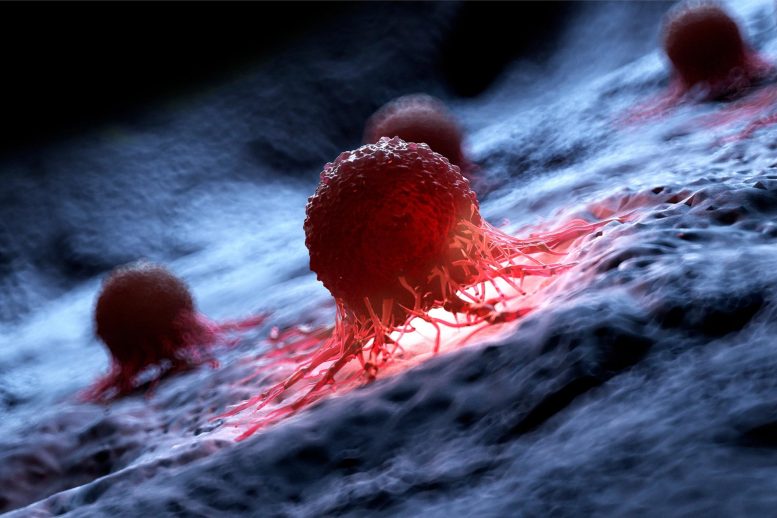
A recent study reveals that a combination of a monobody and MMAE effectively stops blood cancer cell growth in mice, focusing on multiple myeloma. This approach targets RAS mutations in cancer cells, offering new potential in treating relapsed cases and enhancing existing cancer therapies.
A new study in mice has revealed that a specific drug combined with a protein fragment can prevent the growth of blood cancer cells.
This research focused on multiple myeloma, a type of cancer that originates in blood cells responsible for fighting infections through the production of germ-eliminating proteins. In this disease, cancerous cells accumulate in the bone marrow, displacing healthy blood cells and generating defective proteins. Initially, the disease may present without symptoms, but as it progresses, individuals often suffer from symptoms such as bone pain, nausea, mental confusion, fatigue, and increased susceptibility to infections.
In about half of multiple myeloma cases, changes in the DNA of the RAS gene – which encodes a switch that regulates growth – cause the related RAS protein to become “stuck in the on mode” and cause cancer, researchers say. Currently, there are no effective treatments for multiple myeloma when patients relapse, a setting where genetic changes (mutations) in RAS become more common. This includes attempts to directly counter abnormal RAS function, which has moved the field to explore other ways of targeting RAS tumors.
The Role of Macropinocytosis in Cancer
Along these lines, RAS mutations also turn up a cellular pathway called macropinocytosis, which normally engulfs nutrients like proteins and fats outside of cells, and pulls them inside where they can be used as extra metabolic fuel. Cancer cells cannot multiply without these supplies, and those with RAS mutations become uniquely capable of this type of scavenging, the study authors say.
Led by researchers at NYU Grossman School of Medicine and Tezcat Biosciences, the new study found that a carefully chosen protein called a monobody, linked to a drug called MMAE that prevents cells from multiplying, were together pulled inside the cancer cells to stop abnormal growth in both cell tests and in live animals with the disease.
“Our new approach targets cancers that have been very hard to treat,” said study first author, Nathan Beals, PhD, a post-doctoral researcher in the Department of Biochemistry and Molecular Pharmacology at NYU Langone Health. “We are taking advantage of a process that is significantly overactive in cancer cells, which focuses the treatment effect on abnormal cells.”
The work was recently presented the 2023 annual meeting of the American Society of Hematology (ASH) in San Diego, and was based in part on monobodies, a class of compounds originally invented by NYU Langone faculty member Shohei Koide, PhD and colleagues in 1998. The current research team designed a monobody with a simple protein framework that is engulfed by cancer cells with RAS mutations.
Once taken into cancer cells via mutant RAS-induced macropinocytosis, the monobody-MMAE conjugate blocked the action of cell skeleton components (microtubules), and so kept the cancer cells from dividing and multiplying.
Impact on Cancer Cells and Potential Clinical Relevance
Studies in isolated, human, RAS-mutant multiple myeloma cells showed that they have continual macropinocytosis underway, whereas normal cells do not. A cell-tracking technology then showed that the study monobody was taken up through macropinocytosis at a high level into multiple myeloma cells, but did not enter cells when the process was not underway. Once inside, the conjugate caused up to a five-fold increase in the death of RAS cancer cells when compared to normal cells.
In studies in live mice with mutant RAS multiple myeloma tumors, treatment with the conjugate at a relatively lower (sub-optimal) dose resulted in a roughly a six-fold decrease in tumor size after 21 days, while control tumors showed no significant difference in tumor volume. In a subsequent study, a larger dose of the conjugate killed mutant RAS tumors, with no relapses over 60 days, in a “dramatic improvement” over standard care options, the authors said.
In addition, improved outcomes were seen when the conjugate was used in combination with standard anti-cancer treatments, enabling them to be effective at lower doses (with the potential for fewer side effects).
“Our conjugate improved survival in early tests, and has the potential to be important clinically against multiple myeloma,” said study senior author Dafna Bar-Sagi, PhD, senior vice president, vice dean for science, and chief scientific officer at NYU Langone Health.
Meeting: 2023 annual meeting of the American Society of Hematology (ASH)
Along with Drs. Beals and Bar-Sagi, other NYU Langone study investigators were Faith Davies, MD, and Gareth Morgan, MD, PhD, in the multiple myeloma research program at NYU Langone’s Perlmutter Cancer Center.
NYU holds patents with respect to the study technologies. Dr. Bar-Sagi holds related patents as well, along with intellectual property rights licensed by Tezcat. Dr. Davies is a paid consultant or advisor to Sanofi, Pfizer, BMS/Celgene, GlaxoSmithKline, Regeneron, Amgen, Janssen, and Takeda. Dr. Morgan has previously consulted for Sanofi. These relationships are being managed in accordance with the policies and procedures of NYU Langone Health.
Study co-investigators Craig Ramirez, PhD, and Andy Hauser, PhD, are former members of Dr. Bar-Sagi’s lab who co-founded Tezcat Biosciences, which funded the study.









Quitting sugar altogether is a much better way to starve the cancer cells. And there are no nasty side effects. But that way the Big Pharma can’t make any money on you.